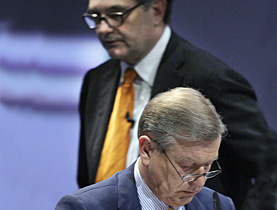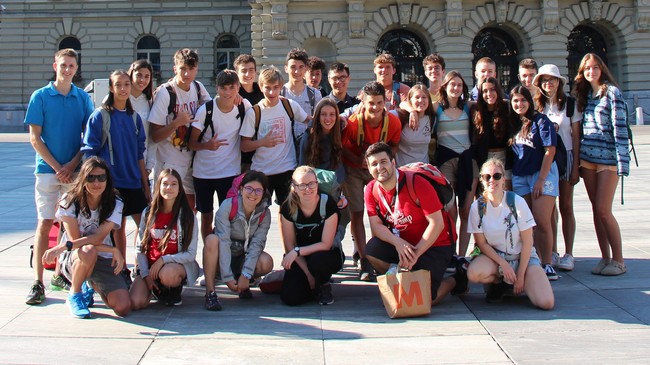
Time comes for blame and questions in UBS case

Bank UBS has dodged what was certain to be a costly legal battle with United States tax authorities but Swiss experts say that hard questions still remain.
No new details emerged on Friday over a settlement between the Internal Revenue Service (IRS) and UBS in a case over client confidentiality and tax evasion, but the storm has eroded the pillars of Swiss banking and left many wondering what comes next.
Whatever the terms of the final settlement, one thing is clear, says Boris Zürcher, head of economic policy at the think tank Avenir Suisse: UBS is a liability for the Swiss government.
“As we’ve seen with the IRS-UBS case, deliberate decisions taken by the bank’s board can have serious political repercussions for Switzerland,” he told swissinfo.ch. “This is an impossible situation. What is needed now is some realignment of the banks and Swiss policy.”
UBS had faced trial at a US District Court in Florida over an American demand to hand over the names of 52,000 wealthy US clients believed to have hidden assets at the Swiss bank to avoid taxes. Providing that information without sufficient evidence of fraud would have broken Swiss law.
Negotiators from both sides of the Atlantic have initialed an out-of-court settlement but are keeping specifics under wraps until sometime next week.
Investigating UBS
That has irked leaders in the centre-left Social Democratic Party, who have wondered in recent days who will foot the bill for the intensive manpower required to keep UBS out of court. Some estimates say the case has cost upwards of SFr50 million ($46.6 million).
Justice Minister Eveline Widmer-Schlumpf told public radio on Friday that the government would look at its legal options for asking UBS to offset the costs, which UBS has said it is willing to do. She added that the state had intervened within the realm of its normal mission and not so much as an advocate for UBS.
But the Social Democrats want to find those responsible for causing the imbroglio in the first place. On Friday the party asked a Zurich prosecutor to start criminal proceedings against former UBS executives Marcel Ospel and Peter Kurer for allegedly engaging in unfair management practices and abetting tax evasion in connection with US clients.
“Many elements are still deep in the shadows as the government does not want to reveal the nature and scope of the arrangements,” the party said in a statement.
Zurich public prosecutor Peter Pellegrini told the Tages-Anzeiger newspaper on Friday that an investigation into UBS could not be ruled out.
Other banks at risk?
Former UBS president Nikolaus Senn said he fears the Americans will now train their barrels on other banks, since all Swiss asset management firms hold untaxed wealth.
“When things have calmed down at UBS, the Americans will try to do this with other banks,” he said in an interview with the News journal on Friday. The one bit of good news: He expects cash flowing out of UBS in the US to stop, as the tax dispute had “totally blocked” UBS there.
Ivan Pictet, president of the Geneva Financial Centre, said there was no indication yet that the settlement would benefit the Swiss financial centre but that a “crusade” by the American authorities on other banks seemed unlikely.
“Many things are not very logical,” he told the Swiss news agency. “I do not see the United States going on a crusade against Swiss banks, especially if they have not committed any crime on US soil.”
Realignment
Zürcher says the big challenge for Switzerland and UBS now concerns credibility and the protection of public interests, given that the Swiss government stepped so dramatically into the affairs of a company that controls assets three times the gross domestic product of the entire country.
“The bank is too big to save and too big to fail,” he said. “The government needs to take responsibility, not operational responsibility, but UBS and Credit Suisse are no longer private enterprises that can act independently of the government.”
Unless UBS “shrinks massively” and becomes a “normal bank” again, then the government needs to have a seat on the board as long as it has a stake in the company.
As for the future of banking, Zürcher said it is too dramatic to say the Swiss have come to the end of an era. Instead, loopholes need to be closed in laws designed to keep black money out of the country.
Another option: Liechtenstein recently announced plans to require British depositors prove their money has been taxed before it can be placed in the principality’s banks.
“Then it’s not black money anymore,” Zürcher said. “That is a potentially viable model for Switzerland.”
Tim Neville, swissinfo.ch
The New York Times reported on Thursday that 150 American clients are likely to face criminal charges for tax evasion as a result of the case against UBS.
According to the report, which was based on an anonymous source who had been briefed on the matter, dozens of prosecutors across the country were about to file criminal complaints. Those of interest were people who had set up offshore entities to avoid taxes, as well as those who had contact with Switzerland-based UBS bankers, be it over the phone, internet or by mail.
Other accountholders who could have their information revealed include those who used secret accounts to launder money from illegal pursuits such as drugs and prostitution. Others include multinational citizens who have banked in Switzerland and “assets protectors”, such as doctors who want to shield property from malpractice payouts.
UBS stocks have reacted warmly to the news of the settlement. Shares outpaced the Swiss exchange on Thursday to close 5.39 per cent up at SFr17.22.
On May 14, 2008, former UBS employee Bradley Birkenfeld and a Liechtenstein businessman were charged by the US authorities with helping an American billionaire avoid paying taxes on $200 million of assets deposited in Swiss and Liechtenstein bank accounts.
Birkenfeld turned whistleblower, giving details of UBS private banking practices to US prosecutors.
UBS agreed in February to pay $780 million and name some United States clients to resolve criminal fraud charges against it. However, this did not affect a separate demand from the IRS for the details of 52,000 UBS clients, in direct contravention of Swiss banking secrecy laws.

In compliance with the JTI standards
More: SWI swissinfo.ch certified by the Journalism Trust Initiative
















![The four-metre-long painting "Sonntag der Bergbauern" [Sunday of the Mountain Farmers, 1923-24/26] had to be removed by a crane from the German Chancellery in Berlin for the exhibition in Bern.](https://www.swissinfo.ch/content/wp-content/uploads/sites/13/2025/12/01_Pressebild_KirchnerxKirchner.jpg?ver=cb688ed5)














You can find an overview of ongoing debates with our journalists here . Please join us!
If you want to start a conversation about a topic raised in this article or want to report factual errors, email us at english@swissinfo.ch.